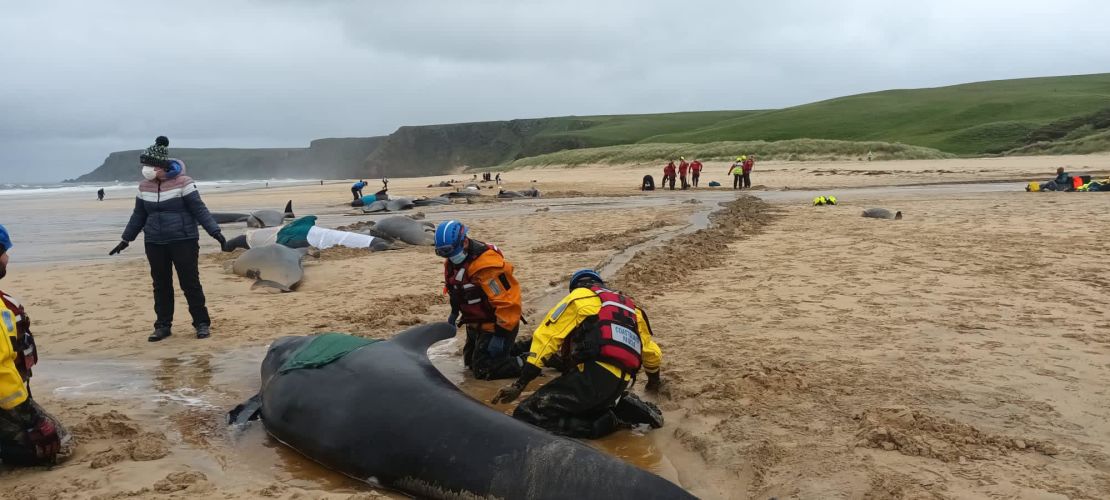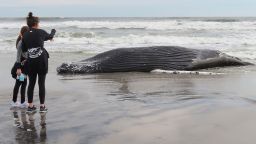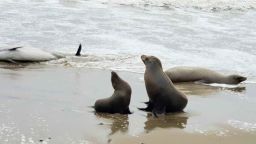A pod of more than 50 pilot whales has died after a mass stranding on a northwestern Scottish island, according to a marine charity on the ground.
British Divers Marine Life Rescue (BDMLR), which responded to the report of the stranding on Sunday, said most of the 55-strong pod died shortly after washing up by the village of North Tolsta on the Isle of Lewis, with only 15 still alive when they were found Sunday morning.
“Many of the animals were already found dead, so it seems that they had been stranded during the night,” Dan Jarvis, BDMLR’s Director of Welfare, said.
Speaking to CNN on Monday, he explained that whales can only survive for around six hours on land before they start to deteriorate.

“They have lost the ability to support their own weight when they’re out of water because they live in the marine environment where they’re essentially weightless – their skeletal structure doesn’t have to support their own weight any more,” Jarvis told CNN.
When the marine animals begin stretching, they gradually start to “crush themselves under their own weight,” which can cut off circulation and lead to a buildup of toxins that can be fatal, he explained.
After attempts to refloat two of the more active whales, one was successfully released, while the other was re-stranded and later died.
Officials made the decision to euthanize the remaining whales, which had been out of the water for hours, on “welfare grounds” around 3:30 p.m. (10.30 a.m. ET), after concluding that the “shallow beach and rough wave conditions made it too unsafe to refloat the remaining animals,” the statement from BDMLR said.
The Scottish Marine Animal Stranding Scheme (SMASS) said it could be the “largest fatal mass stranding event we’ve had in Scotland for decades.”
Why do strandings happen?
Known to be gregarious, pilot whales have “extremely strong social and emotional bonds with one another,” Jarvis told CNN. “If one animal is in difficulty and becomes stranded, the rest of the group – or at least some of them – will follow that animal in trouble and get stranded as well.”
One of the dead whales appeared to have a vaginal prolapse, which experts believe could have been the reason the entire pod was stranded.
The SMASS said on social media that it will be “conducting sampling and necropsies” of the whales to better understand their health and why they may have stranded.
Whale strandings are on the rise in the UK, although experts are still looking for a reason behind the increase.
“We’re not entirely certain why that might be, whether that’s a shift in the range and distribution of the population. Maybe it’s climate change related and they’re being pushed further to the food, or away from other areas that they used to inhabit and they’re exploring new areas,” Jarvis said.
Peter Evans, a veteran marine mammal scientist and director of Sea Watch Foundation, a UK marine environmental research organization, told CNN in an email Monday that while overall whale strandings aren’t rising, they may be in the case of certain species.
“Trends can reflect increased population sizes, some specific human pressure causing mortality (e.g. underwater noise, entanglement in fishing gear), or simply improved reporting,” he said.
One cause of underwater noise is the use of sonar – using sound waves to see in water – by the military. According to a study published in the journal PNAS last year, multiple whale species slowed or halted foraging behaviors when they heard naval sonar or predator sounds.
But there is no single cause for a stranding, Evans emphasized, adding that they could be the result of injury, poor health or navigational error.
Pilot whale strandings are common across the world. In the UK, the largest stranding of pilot whales was in Scotland in 2011, when 77 were found stuck on the country’s northerly shores, according to Jarvis.
Last September, around 200 were beached along the coast of Tasmania, Australia. Of that number, only 35 survived and were refloated. Tasmania’s largest stranding was in 2020, when more than 450 pilot whales were found.


